Embarking on a career in aviation opens doors to a plenty of diverse and exciting pathways beyond the cockpit. While the image of a pilot soaring through the skies often takes center stage, the aviation industry offers a wide range of rewarding careers suited to various interests and skill sets. Here are the Top 10 jobs in the aviation industry to explore for a fulfilling career.
Table of Contents
TogglePILOTING
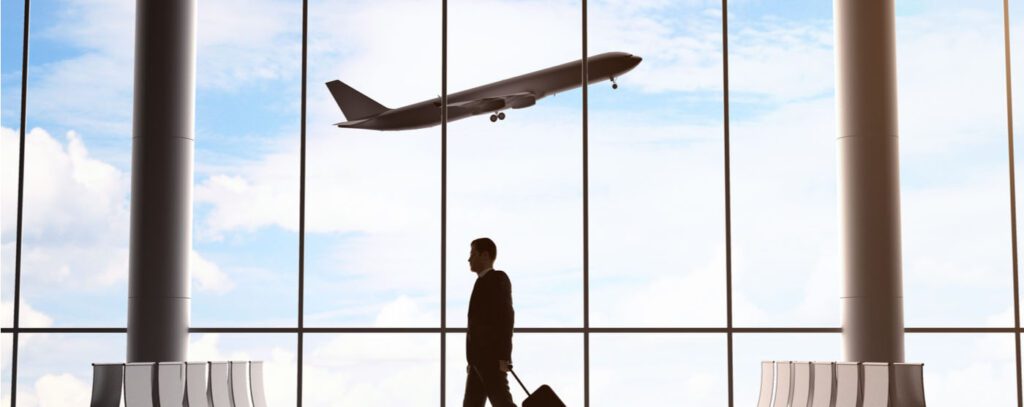
Undoubtedly the most prominent career choice in aviation. Pilots take command of aircraft, transporting passengers or cargo across the globe. This path demands rigorous training, skill and a passion for flying. Safety of the cargo and every passenger is the responsibility of the pilot. Cost of training is expensive to say the least and the licence gained comes with an expiry date, which again has cost implications to keep renewed as a lapsed licence has its value diminished. Days begin with rigorous pre-flight checks, ensuring safety measures are met.
Navigating diverse weather conditions and managing intricate flight systems demand constant focus. Long hours in the cockpit, coupled with time away from family, underscore the sacrifices. Dealing with air traffic control, adhering to strict schedules, and staying updated on aviation regulations are routine challenges. Pilots have to undergo numerous trainings and examinations periodically which amount to a lifetime of studying. In India, the basic requirement is completion of higher secondary education, i.e 10+2 with math and physics. Next you will have to join a flight school of your choice.
Chick here to read about how to find the best flight school.
CABIN CREW / FLIGHT ATTENDANT
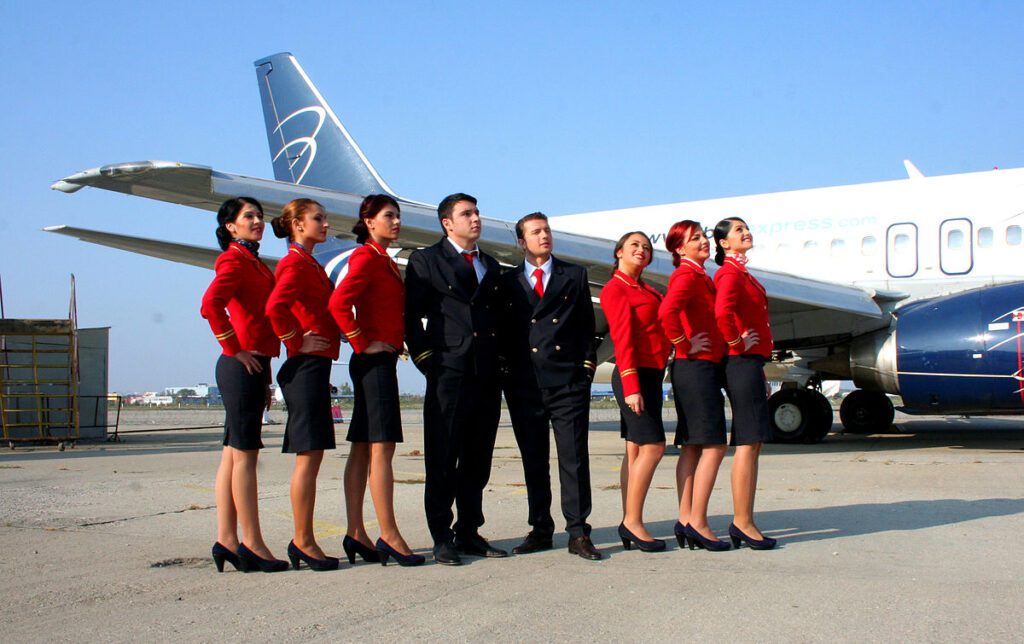
Cabin Crew – Cabin Crew in India lead dynamic lives filled with diverse experiences. From ensuring passenger safety during takeoff and landing to delivering impeccable service in-flight, they navigate the skies with grace. Their days involve meticulous preparations, from checking emergency equipment to attending pre-flight briefings. Constantly adapting to varying schedules and time zones, they balance work and personal life, often spending nights in different cities. Dealing with diverse passengers, language barriers, and occasional turbulence, they maintain composure and professionalism. Always keeping in mind their core responsibility to ensure safe evacuation of every person in case of an emergency.
To become a flight attendant in India, one typically needs a minimum of a higher secondary education, i.e 10+2. Good health and fitness is crucial, as flight attendants need to handle the physical demands of the job and pass medical examinations. Proficiency in English and in some cases, knowledge of additional languages is an asset. Upon initial selection, a successful completion of a flight attendant training program provided by the airline, covering safety procedures, emergency protocols, and customer service is a must. Click here to know more in detail about cabin crew training.
AIR TRAFFIC CONTROLLER
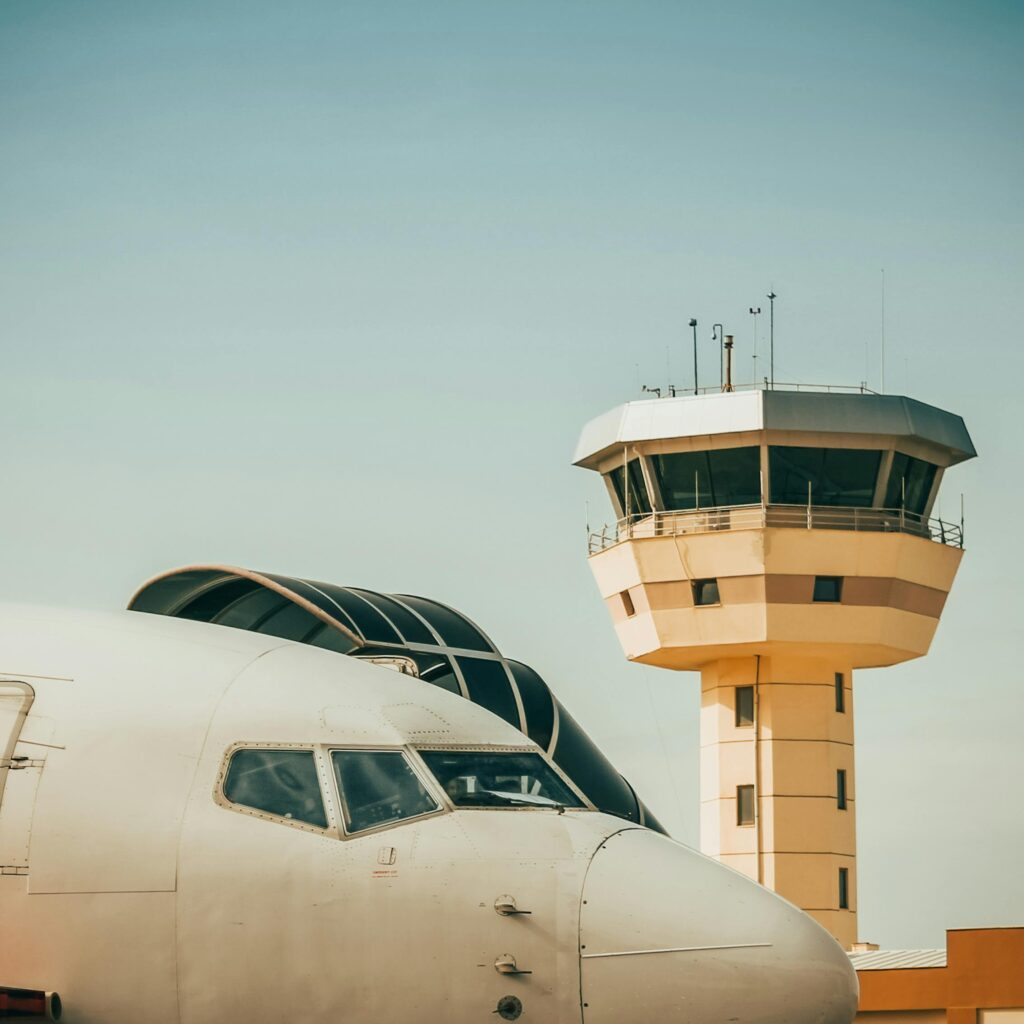
Air traffic controllers ensure the safe and efficient movement of aircraft in the sky and at airports, choreographing complex routines for takeoffs, landings, and routes. An air traffic controller is responsible for maintaining a safe distance between aircrafts and providing reliable information to pilots whenever needed. Their job demands sharp multitasking, quick thinking, and effective communication under pressure. Shifts can be challenging, often requiring vigilance during odd hours. The controllers rely on advanced radar and communication systems to maintain order in the skies. Despite the pressure, the fulfillment comes from safeguarding lives and ensuring the smooth flow of air traffic, making it a dynamic and impactful profession in the Indian aviation landscape.
To become an air traffic controller in India, candidates typically need a bachelor’s degree in any discipline from a recognized university. Additionally, they must meet specific eligibility criteria set by the Airports Authority of India (AAI). One often has to undergo a rigorous selection process, which includes written tests, interviews, and medical examinations, followed by specialized training at the Air Traffic Training Centers. Strong communication skills, the ability to handle stress, and quick decision-making are essential for this role. A class 3 medical is also required from a DGCA approved doctor. Click here to find the closest to you.
AEROSPACE ENGINEER
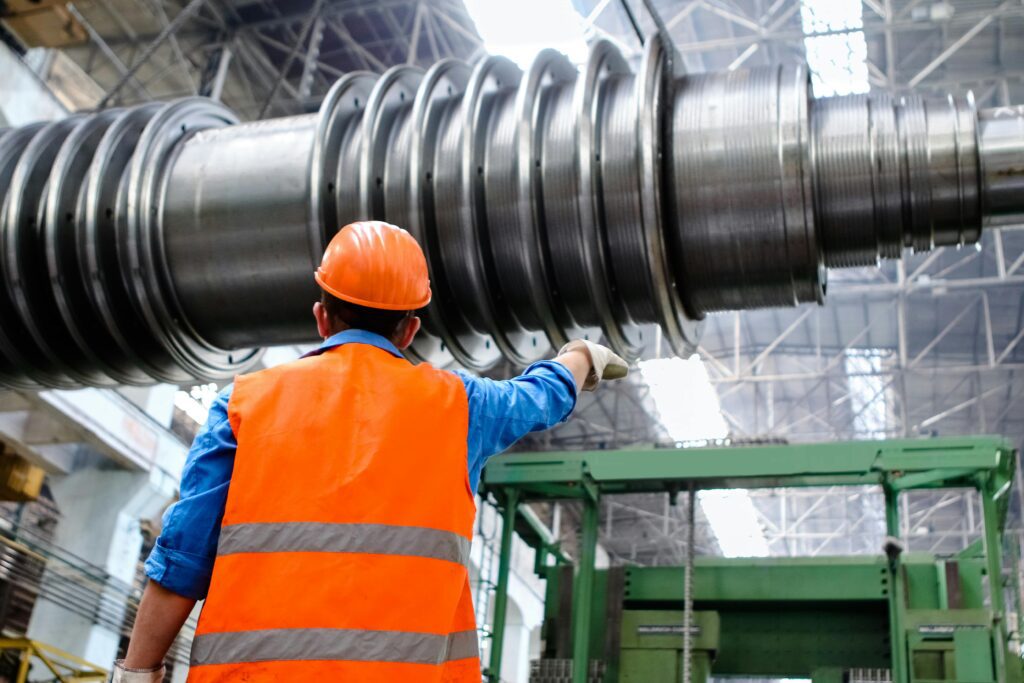
Engineers in this field design, develop, and maintain aircraft and spacecraft. They play a pivotal role in innovation, crafting the next generation of aviation technology. Engineers can assume the roles of design and development, Testing and Evaluation, Research and Problem solving with a specialization in Aerodynamics, Propulsion systems, Structures and Avionics. Daily routine of an aerospace engineer can be dynamic, with tasks varying based on the project phase, company culture, and individual responsibilities. The work often involves a blend of technical expertise, problem-solving, collaboration, and innovation to contribute to the aerospace industry’s advancements.
To become an aerospace engineer in India, you typically need a bachelor’s degree in aerospace engineering or a related field. Admission to an engineering college requires completion of 10+2 with Physics, Chemistry, and Mathematics. Entrance exams like JEE (Joint Entrance Examination) are often required for admission to top engineering institutes. After completing a bachelor’s degree, some pursue a master’s or further specialization in aerospace engineering for advanced career opportunities. GATE (Graduate Aptitude Test in Engineering) is a common exam for postgraduate admissions.
AVIATION SECURITY

Security officers in India play a crucial role in ensuring passenger safety. Their responsibilities include screening passengers, luggage, and cargo using advanced technology. They vigilantly monitor security checkpoints, looking for potential threats and implementing stringent measures. Collaborating with law enforcement agencies, they respond swiftly to any suspicious activities. Continuous training keeps them updated on evolving security protocols. Balancing strict adherence to procedures with a customer-friendly demeanor is essential.
To become an airline security officer in India, the typical qualifications include a bachelor’s degree in any discipline, with some agencies having specific preference for degrees related to security or aviation. Completion of recognized security training programs is mandatory. This may include courses on aviation security, threat assessment and emergency response procedures. A thorough background check is conducted to ensure one’s integrity and reliability. Proficiency in English and sometimes additional languages is beneficial for effective communication.
AIRCRAFT TECHNICIAN
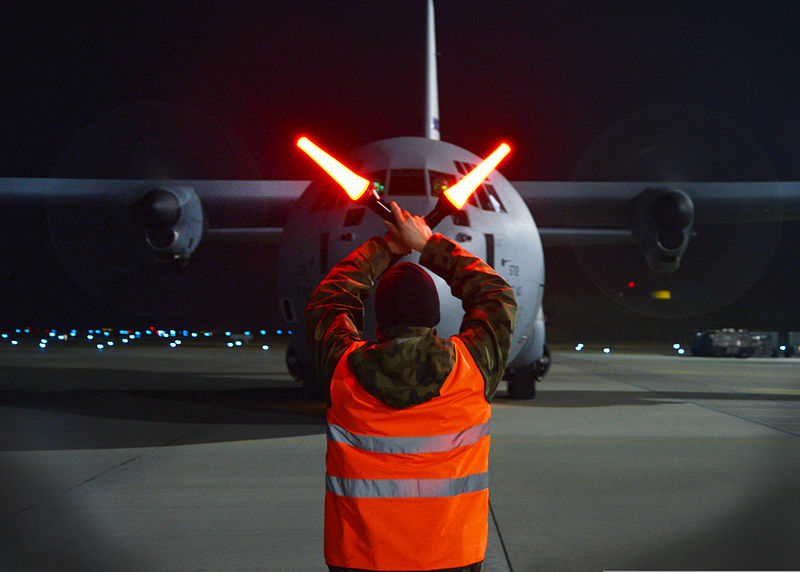
Aircraft technicians ensure the safety and functionality of planes. Their days revolve around intricate inspections, diagnosing mechanical issues, and performing repairs. Meticulous attention to detail is crucial as they examine engines, electrical systems, and other critical components. They collaborate closely with engineers and pilots, employing specialized tools and following strict protocols to maintain aviation standards. Long hours and variable shifts are common, as aircraft demand constant vigilance for maintenance and unexpected repairs.
In India, becoming an aircraft technician requires a diploma or a degree in Aeronautical Engineering, Aircraft Maintenance Engineering (AME) or a related field from a recognized institute approved by the Directorate General of Civil Aviation (DGCA). Technicians must undergo practical training and obtain a license from the DGCA by passing the required examinations.
AVIATION MANAGEMENT / ADMINISTRATION

Professionals in this field oversee the operational and business aspects of airlines, airports or aviation related organizations. They manage finances, logistics, strategy and ensure compliance with safety standards. From coordinating schedules to managing budgets, their responsibilities span across various domains, requiring adeptness in communication and decision-making. They navigate a dynamic environment, balancing the demands of efficiency, customer satisfaction, and industry protocols.
In India, a career in aviation management or administration typically requires a bachelor’s degree in aviation management, aviation administration, business administration with a focus on aviation or a related field. Some universities or institutions may offer specialized programs in aviation management. Additionally, having a background in subjects like economics, finance or engineering can be beneficial. Moreover, gaining practical experience through internships or entry-level positions within the aviation industry can greatly enhance one’s prospects.
AIRCRAFT MAINTENANCE ENGINEER
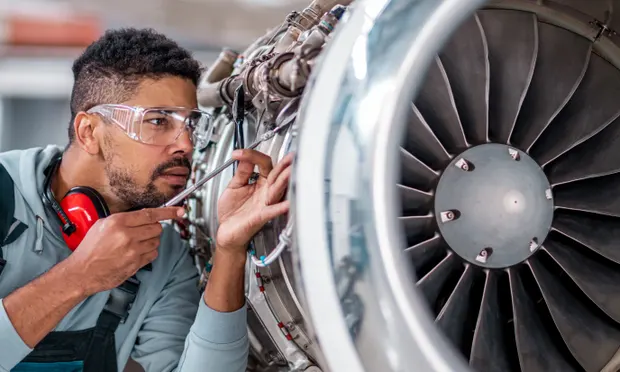
An aircraft maintenance engineer lives a detailed, high-stakes routine. Their days revolve around precision, ensuring planes are safe and operational. With keen attention to detail, they inspect, troubleshoot, and repair aircraft, meticulously following stringent safety protocols and technical guidelines. Each task demands focus, from routine check-ups to complex repairs, ensuring planes meet rigorous standards for flight. Balancing expertise in mechanics, electronics and aviation, they take feedback from pilots about serviceability of aircrafts to rectify any defects, dedicating themselves to preserving the safety of passengers and crew.
In India you will need a higher secondary education, i.e 10+2 in science and enroll with a DGCA approved Aircraft Maintenance Engineer (AME) course which will have further specialization in Mechanical, Avionics and Aeronautics.
AVIATION SAFETY

Specialists focus on ensuring compliance with safety regulations, conducting inspections, and developing security protocols to safeguard the industry. An aviation safety officer is responsible for monitoring and enforcing safety regulations. They collaborate with airlines, conduct inspections, and investigate incidents to enhance safety protocols. Daily tasks involve analyzing data, implementing preventive measures, and coordinating with regulatory authorities. The officer also conducts safety training for aviation personnel, emphasizing compliance with international standards. Adapting to evolving technologies and addressing emerging risks, their work is pivotal in maintaining the integrity of the aviation industry, safeguarding passengers and fostering a culture of safety.
In India, qualifications to become an airline safety personnel typically include a bachelor’s degree in aviation, aeronautical engineering or a related field. Specialized courses in aviation safety management are often preferred. Additionally, you may need relevant certifications offered by the Directorate General of Civil Aviation (DGCA) in India, like the Aircraft Maintenance Engineer License or Flight Dispatcher License.
FLIGHT DISPATCHER
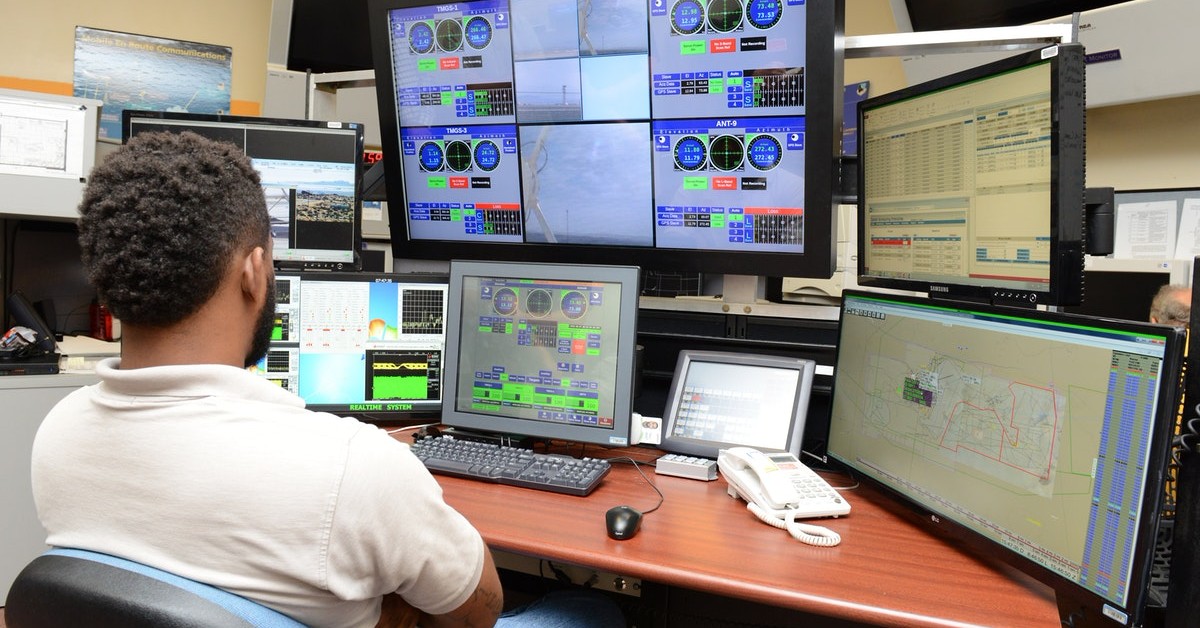
Flight dispatchers coordinate flight plans, monitor weather conditions, and communicate with pilots, playing a critical role in flight safety and efficiency. They meticulously plan flight paths, considering weather, fuel requirements, and safety protocols, ensuring seamless departures and arrivals. Their day begins long before take-off, analyzing weather patterns, coordinating with pilots, and crafting detailed flight plans. They handle multiple flights, staying attuned to changing conditions and making quick, decisive adjustments. Precision, adaptability, and unwavering focus define their role, as they remain the unseen force behind each successful flight. In India, a flight dispatcher requires a bachelor’s degree in aviation (preferred), and completion of a flight dispatcher’s course is essential which is DGCA approved. Click here to know more in detail about the training.
Conclusion
From navigating the skies to shaping the future of aerospace technology, the aviation industry offers a myriad of career paths, each with its own challenges and opportunities. We all have to start somewhere but starting is the most important. Whether aspiring to fly, design innovative aircraft, manage operations, or ensure safety, the aviation industry provides a diverse landscape for passionate individuals to soar in pursuit of their professional aspirations
These are of course just my opinions based on my experiences and gained knowledge. Differences in opinion are welcome.


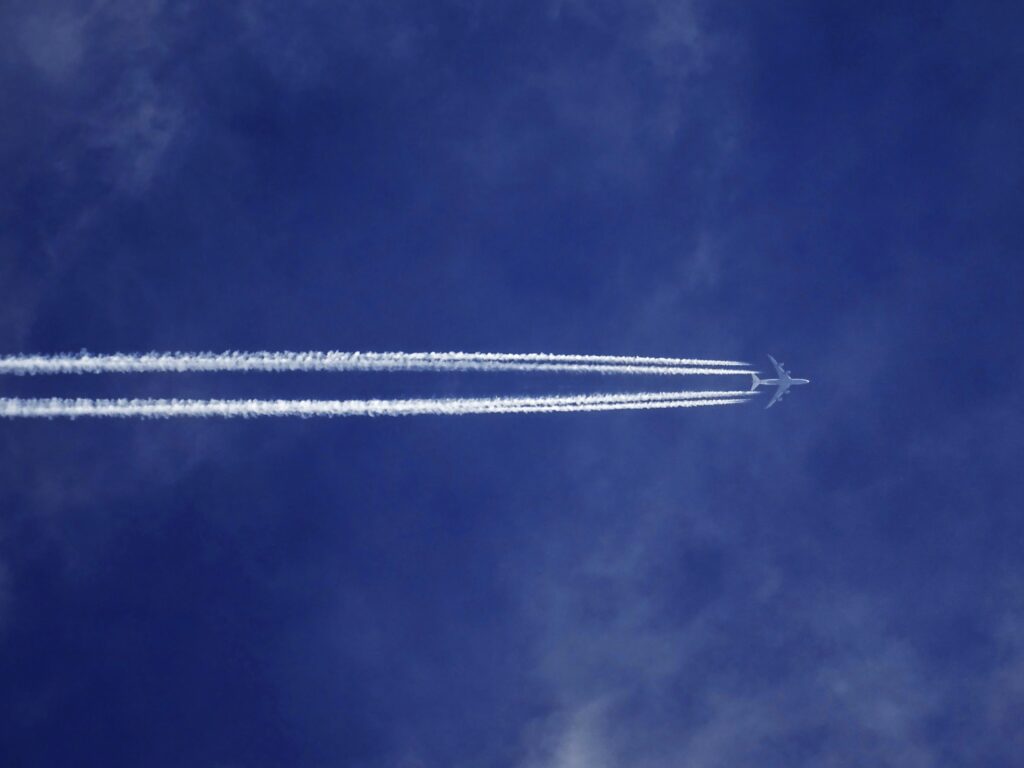
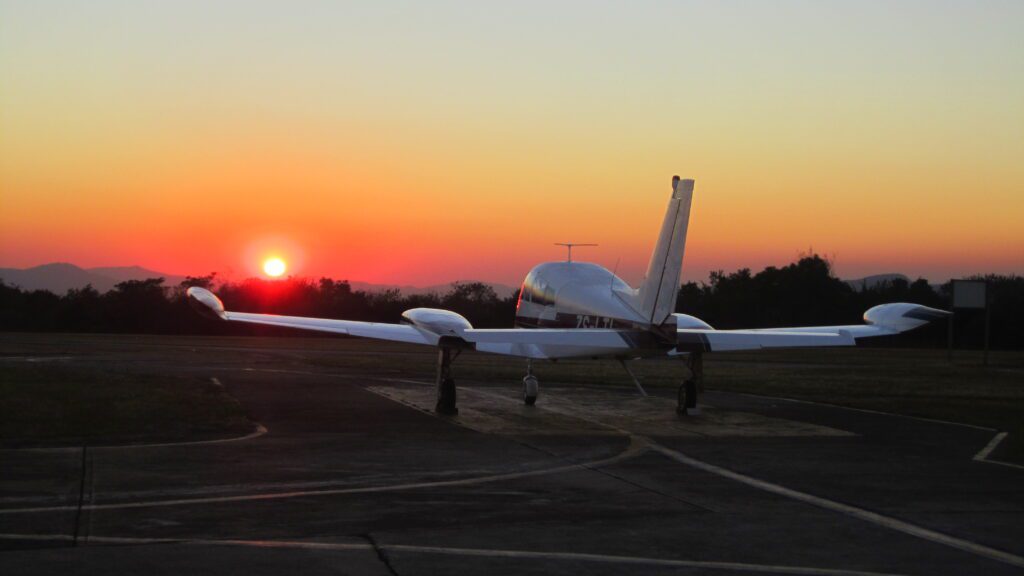
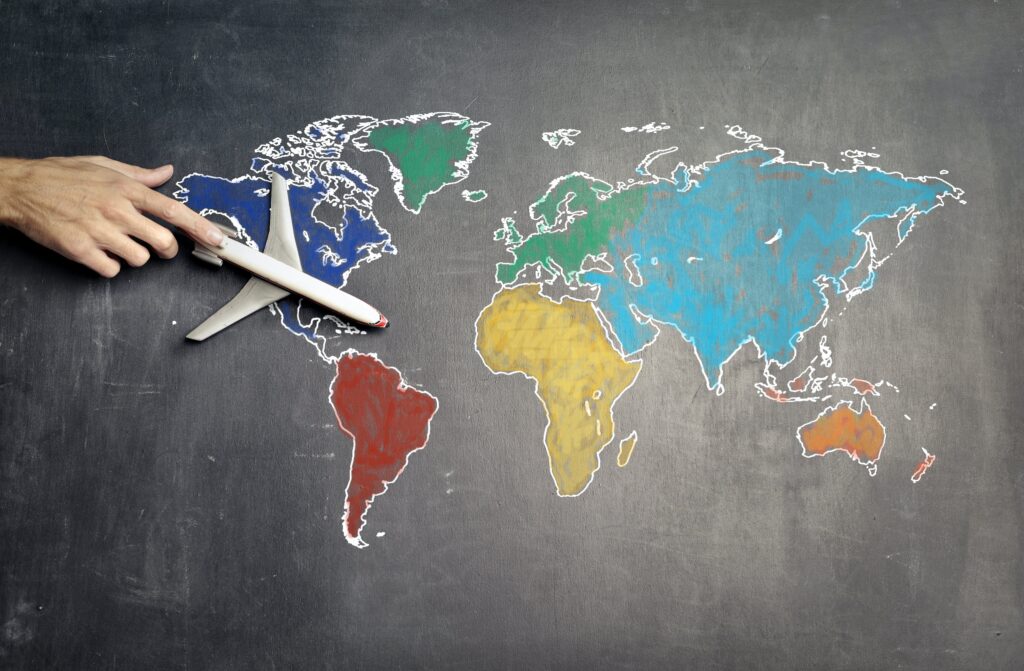
Thank you for a quick insight into this domain.. Could you also talk about programs rolled out by airlines to train pilots? Its a vast pool which feels absolutely a nightmare to navigate.. Would love to connect over Instagram if it would help streamline conversation
Hi, yes I am currently working on this topic and I will publish my opinion soon.